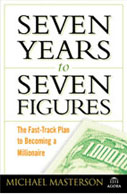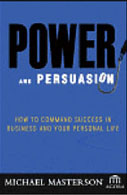- WEALTHY: The first - and most important - thing you need to know about selling your product or service (Michael Masterson)
- WISE: Michelangelo on how much to aim for in life
ALSO IN THIS ISSUE: - Another good reason for that big grin on the face of your happiest friend
- A word that you might use to describe a potentially disastrous situation

* Highly Recommended * The Only Three Ways to Grow a Business Did you know that there are only three ways to grow a business? 1. Increase the number of customers. 2. Increase the average transaction value. 3. Increase the frequency of repurchase. Find a way to maximize each one, and your business will experience an astonishing rate of growth. In his "9 Pillars of Business Growth" program, acclaimed consultant Jay Abraham outlines hundreds of proven, frequently unrecognized, and almost totally underutilized ways to grow these three key areas of your business. If you own a business (or would like to), be sure to take a look at Jay's program. - Charlie Byrne 
Selling Is Simple - Keeping It Simple Is Hard By Michael Masterson When you are in business, your job is to sell. If your business is good, you will be providing good value for a fair price. If you are doing that - providing something valuable at a good price - you should do it enthusiastically and without hesitation. The formula for doing that is simple: - You create attractive images.
Anything else you may be tempted to do is completely unnecessary. And more often than not, it will thwart the sales process. Experienced marketers are the last to see the badness in their own marketing, because they already know the rules and have done the deeds. You can't tell them anything. They've been there and back. But when their businesses break down because they have decided to take a "new and different" approach to selling - and every business will - they begin to look for answers. That's when they are willing to listen - when they are already hanging from a limb, perched over the precipice of disaster. Still, late is better than never. And when someone does suggest, "Why don't you go back to the basics?" they are suddenly astounded and enormously appreciative of the amazing insight they've been given. It's natural to drift away from the basics. After all, we are intelligent, complicated beings. Who would be content to bang away on the same six bongos year after year when there is an entire orchestra of instruments waiting to be played? Intelligent marketers have the advantage of being able to see patterns that their less-gifted colleagues fail to notice. They learn quickly and often rise like shooting stars. But unless they stick to the basics, they may find that their advertising isn't working anymore. And if they take the time to figure out why, they may discover that they simply forgot the most important marketing "secret" they ever learned: When it comes to selling, simplicity is always the best course of action.  "The greater danger for most of us is not that our aim is too high and we miss it, but that it is too low and we reach it." - Michelangelo ETR's Unique Goal-Setting System:
How to Accomplish All Your Most Important Goals ... Without Fail By Michael Masterson Every January, I write down a set of goals. Some are financial. Some relate to my business. And some are personal. When I put my new list down on paper, I feel powerful and confident. Here are the things I will accomplish this year. Clean and simple. I imagine how I will feel when they are completed, and that feeling is good. Start Today by Selecting Your Goals - the Rest Is Easy Take out a sheet of paper. Title it "Life's Goals" (if you have no shame) or "Stuff to Do Before I Croak" (if you are afraid someone will see it). Now make a list of everything you want to accomplish. Everything. Making a lot of money. Writing books. Traveling to Rome. Learning to tap dance. Write till you are done. Next, you need to convert that list into long-term Life Goals. One of them, of course, will be to build wealth - not in order to accumulate money, but because of what that money can help you accomplish in terms that are more important. After all, financial independence gives you the ability to help other people, provide for your family, pursue your intellectual and artistic interests, and become an inspiration to members of your community. Narrow your list down to four. Think in terms of a long-term wealth-building goal, a long-term health goal, a long-term personal-relationship goal, and a long-term personal growth and development goal. These are your top priorities, your bottom-line objectives. Of the four, pick one that is numero uno. On a separate sheet of paper - or perhaps on an index card - write down your four Life Goals with the top choice on top. Highlight that one. The plan you are about to learn will pretty much guarantee that you will achieve all four of these objectives. It will definitely allow you to complete the first one. How good is that? Consider this: If you haven't done these things yet and you're over 30, there is an 80% chance that you won't accomplish them ... ever. Unless you follow this program. Okay. Here's what you need to do now. Convert those four goals into five-year mid-term objectives. For example, let's say that one of your Life Goals is to have a net worth of $10 million by the time you retire. And let's say you want to retire in 10 years. You might make "having a $5 million net worth" your five-year goal. Now, use this five-year list to create a one-year list. To have a net worth of $5 million in five years, you will have to have a net worth of $1 million at the end of one year. Figure out what you have to do to - invest in real estate, start a new business, save more - to reach that one-year goal. Then move on to year two, year three, and so on. Setting Monthly, Weekly, and Daily Objectives After you've developed yearly goals, you need to break them down into manageable, bite-sized monthly objectives. Let's say one of your yearly objectives is to get a business started. So you would break that down into 12 monthly goals - what you need to do each month to get your business up and running, from doing the initial research to the grand opening. Then, break each of those 12 monthly goals into four weekly goals. For instance, if your first monthly goal in getting a new business started is to identify a good business opportunity, perhaps each of your four weekly goals will be to research at least 10 possibilities. Finally, you work your way down to the action you will take each day to fulfill your weekly objectives. If you have made a commitment to research 10 business opportunities each week, one of the top priorities on your daily "to-do" list will be to research two possibilities. Expect to spend a good chunk of time planning out your year. Once a month, you'll sit down for two or three hours to map out your goals for the next four weeks. Once a week, you'll spend one hour establishing your goals for the next seven days. And you'll spend about 30 minutes each morning organizing your day. I know that sounds like a lot, but you're really spending no more than the equivalent of a few days a year to map out your strategy for achieving your long-term Life Goals. This is how I establish my own goals, focus my objectives, and set daily tasks. It's not, by any means, an entirely original system. It's a patchwork of systems that have been developed by others and added to by me. But there is something about this particular system that seems to work. It works so well, in fact, that I encourage everyone who works for me to use it. Those who do find that it works very well. I think you will too. Today's the day that you take the first step toward guaranteeing your success by defining your long-term Life Goals and breaking them down into mid-term five-year objectives. (Finish the job of breaking those objectives down further - into yearly, monthly, and weekly objectives - during the coming week.) Before you get started, here are two tips to make the job easier. 1. When I first started using goal setting as a means to success, I made one big mistake: I was too specific. Since then, I have learned that goals are best that govern least. When you set specific goals, as I used to, you set yourself up for disappointment. Plus, you are likely to miss out on what it is that you really want or need. So here is what I do now... After writing down the specific goal I want to accomplish, I ask myself what it is, in general, that I am trying to do by achieving it. Say, I write down "learning Spanish." I ask myself, "What is it about learning this language that interests me? Is it just the learning of Spanish per se? Do I need it for my work? For my travels?" The answer, of course, is "no." But for me, learning Spanish means I am becoming smarter - and being smart is very important to me. I want to feel as if I'm always in the process of self-improvement, and learning Spanish, or any foreign language, is just one way to do that. So next to my specific goal of learning Spanish, I might write a broader alternative that reads something like, "Learn something big that makes you feel smarter." That "something big" might turn out to be French or wine tasting or the history of the Roman Empire. By recognizing and articulating my larger, vaguer, and often unspoken desires, I am able to set specific goals that can be changed, so long as they generally adhere to my main objective. 2. You not only need to be specific with your goals, you also need to be realistic. For example, if your lifetime financial goal is to have a net worth of $10 million and you are currently 45 years old and broke, it's probably not realistic for you to set a medium-term goal of $5 million in five years. There are no absolute rules when it comes to this type of goal setting. You want your goals to be ambitious ... but you also want them to be achievable. But keep in mind that you don't have to go at it alone. Early to Rise is full of techniques I've developed that will give you an 80% or better chance of accomplishing the goals you set for yourself. [Ed. Note: It's not too late to meet all your goals this year. To quadruple your chances, join over 700 ambitious Early to Risers who receive weekly inspiring, motivating, and energizing advice as members of ETR's Total Success Achievement Program. Click here to learn more.] 
* Highly Recommended * ETFs For Dummies… Discover the simple way to profit from Exchange Traded Funds (ETFs). With ETFs you pay lower fees, take less risk, and get much bigger gains on your stock investing. ETFs let you cash-in on rapid sector moves, make a play on oil, or invest overseas - all with the ease and simplicity of trading stocks. Don't let fear or lack of knowledge hold you back. Find out more about this simple tool that's sweeping Wall Street, and how you can use it to supercharge a 7% profit on Edison International by 174%. You'll find everything you need to know in your FREE report, All About Exchange-Traded Funds... Chris Johnson
Editor, ETF Edge 
3 Ways to Know If Your Cardio Program Is a Waste of Time By Craig Ballantyne In the 1990s, long, slow cardiovascular exercise was a panacea for all our ailments. It promised fast weight loss, optimal heart health, and increased longevity. Today, experience and research is showing us that's not the case. Long, slow cardio is probably a waste of your time if... - You are doing a lot of it and you are not getting results. While that goes for almost any form of training, not a week goes by when I don't hear from a reader who is doing an excessive amount of cardio (in some cases, seven hours per week!) without results.
- You get an overuse injury, which happens frequently when you do too many repetitions of the same movement in a single workout.
- You could be getting better results (or even the same results) in less time. Take two people: Person A runs 60 minutes three times per week. Person B does 25 minutes of strength training followed by 20 minutes of interval training three times per week. Person B will always build a better body.
Your best exercise bet is to stick to three structured workouts per week that incorporate both strength training and time-efficient interval training. Not only will you get better results and improved health, you'll have more time to enjoy your life when you're not stuck on a treadmill for hours on end. [Ed. Note: Craig Ballantyne is an expert consultant for Men's Health magazine and the creator of the Turbulence Training for Fat Loss system. As a writer for ETR's natural health e-letter, Craig will give you practical strategies and real-world scientific discoveries that can help you melt off the pounds, pack on muscle, and eliminate the underlying causes of disease.] 
It's Good to Know: Optimists Live Longer Than Pessimists Optimistic people live longer than pessimists, according to a Mayo Clinic study that was started in the 1960's. The 900 subjects were initially classified as optimists, pessimists, or a bit of both. Then, recently, researchers looked at the status of the test subjects as compared with their expected survival rates when the study began. Optimists had a significantly better survival rate, while there was a 20% increase in the risk of death for the pessimists. Although the report did not try to explain why positive attitude was equated with longevity, it did say that optimists may be less likely to develop depression and helplessness and that they might be more proactive in taking care of themselves. 
* Highly Recommended * Give Yourself a Nice Pay Raise - And A Three Day Weekend, Every Weekend By the end of this week, you can give yourself a pay raise. How does an extra $20/hr sound... and schedule a few days vacation while you're at it! After a month or two, how about another raise... to $2,000 a week. It's happening everywhere. Ordinary people --- including folks who never finished school --- starting their own businesses... and making side incomes in the neighborhood of $40,000... $60,000... even $100,000 or more a year. They're living the American Dream. Now it's time for you to start living it too. Read on... - Charlie Byrne 
Word to the Wise: Precipice A "precipice" (PRES-uh-pis) is a dangerously steep cliff. It comes from the Latin "praeceps" ("headlong"). "Precipice" is often used as a word for a hazardous situation. That's the way Michael used it in today's Business brief: "That's when they are willing to listen - when they are already hanging from a limb, perched over the precipice of disaster." [Ed. Note: Become a more persuasive writer and speaker... build your self-confidence and intellect... increase your attractiveness to others... just by spending 10 VERY enjoyable minutes a day with ETR's Words to the Wise CD Library.] | 









Comments
Post a Comment